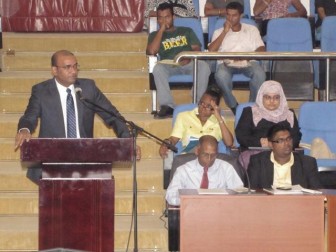-Caricom trade specialist
A top Caricom agricultural official says progress on the Jagdeo Initiative on agriculture for the Caribbean has been slow and there is a tendency to produce large documents with little action following.
Nigel Durrant, Caricom’s Agriculture Trade Specialist, was speaking during a one-day seminar on the Jagdeo Initiative held yesterday at the Guyana International Conference Centre. “We have a tendency to produce large documents but when we bite off more than we could chew, we choke,” said Durrant.

He said that because of the lack of progress on the initiative, a meeting was held on it in November 2011 involving officials of governments in the region. “We floated the idea of a regional agriculture development bank but it has not borne fruit,” he said. He noted that in addition to financing that the development bank would have addressed, another bugbear is health in agriculture trade. He said that sanitary and phyto-sanitary measures are standards and are not supposed to be barriers to trade. “We have to move ahead with dismantling unjust barriers to trade,” he said, adding that at the level of the COTED this is something that is being addressed.
Further, Durrant said that the sector needs to embrace technology or it runs the risk of getting left behind. He said that the institutional structure set up to cover the constraints depend on the quality of the inputs made into them. He said that there needs to be dedicated persons and institutions working together to produce concrete results.
Giving an example of this, he spoke of the ongoing difficulties some rice farmers face in getting payment for their paddy supplied to millers. He said that because of this, those farmers cannot reinvest in the land in a timely manner. “There needs to be a legal and financial instrument to ensure that payments flow through the system,” Durrant said.
Speaking at the forum, former President Bharrat chided those who would complain when the government embarks on a large project. Jagdeo said that it is attitudes and mindsets that will be the downfall of the Jagdeo Initiative and others like it.
He pointed out that although the region is seeking to become more integrated, there is still no common fisheries regime. “We have strong country restrictions [even though we are moving towards an integrated economy],” he said.
Jagdeo said that in every country there could be opportunities for investment and expansion in agriculture but it calls for thinking through problems and issues. “In Guyana, we need to focus on the big issues that will make a difference,” he said, noting that when the government starts a big project people tend to complain.
One such big project is the Chinese-funded new airport, which has drawn its fair share of controversy. He said that Guyana will save US$250 million by accepting the Chinese funding as against borrowing that money from the commercial banking sector.
“[You must] be able to convince ministers of finance in the region [about the viability of agriculture projects. We need to rethink our banking system. There is not a lot of expertise in the commercial banking sector when it comes to agriculture,” he said.
Jagdeo proffered as one solution, agricultural loans that have a longer payback period so that they are less of a risk to the institution.
He noted that some banks in Guyana are discouraging larger deposits, since for them it is bad business. “The [agri] sector needs financing. Money is available but the intermediation needs to be fixed,” he said. He said that there is a need to focus on pan-Caribbean companies for investment possibilities.
Prime Minister Sam Hinds spoke of the role agriculture could play in providing employment and in growing the economy. But he acknowledged all is not well with the initiative.
“There is a sense of frustration and impatience in getting the [Jagdeo Initiative] going. We have to keep the faith, especially when we know how important agriculture is,” Hinds said. “There is need for political and population support,” he said.
“We need to let young people know that agriculture has got money in it,” he said.
Sergio Garcia, an advisor on agriculture in Caricom, said that there needs to be public education on the merits of the Jagdeo Initiative for it to be a success. Garcia also pointed out that food security is more than just availability of food and access to food. He said it is about nutritional intake and economic conditions of persons.
Garcia said that the prevailing global economic crisis, unfair trade arrangements and climate change are all inimical to agriculture in the region.
He said also that for anything to be sustainable, it must be politically viable.
Food and Agriculture Organisation (FAO) representative in Guyana Lystra Fletcher-Paul said that farmers need to build their capacity in order to prepare them for the rigours of investment.
Minister of Agriculture Leslie Ramsammy said that agriculture in Guyana contributes 25 percent of the gross domestic product (GDP). “Guyana continues to be a giant in agriculture in the Caribbean,” Ramsammy declared.




